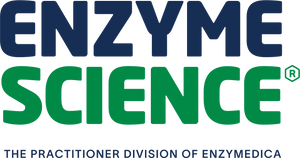Simple Ways to Integrate Enzyme Supplements into your Practice

Simple Ways to Integrate Enzyme Supplements into your Practice
Enzyme supplements can be an effective tool in the care of your patients. Many people with occasional digestive issues often benefit from digestive enzyme supplementation, but enzymes are also useful in a wide variety of clients with different levels of health.
Here are some simple tips for how the use of enzymes can benefit your patients and grow your practice:

Tip#1: Enzymes are helpful for generally healthy people as well as people with occasional digestive problems.
As is the case with any supplement, many patients do not need ongoing digestive enzyme support. But there are those occasional times when we overwhelm our digestive systems by overeating. For instance, celebration meals around the holidays which have higher fat and carbohydrates. Plus other situations that give people occasional indigestion.
The 3 Enzyme Science practitioner exclusive products typically used in these situations are:
Complete Digestion™: for a variety of symptoms including occasional gas, bloating, indigestion, abdominal discomfort, distention, irregularity or general food intolerance.*
Acid Calm™: For occasional heartburn associated with overeating or too many aggravating foods. Contains Zinc Carnosine and demulcent herbs to soothe irritated tissues and promote healthy digestion.*
Intolerance Complex™: Many people have intolerances to gluten, lactose, dairy, beans and other foods which they generally avoid. This combination has specific enzymes that aid in the digestion of these foods.* Particularly helpful in situations of accidental consumption, or where people can’t avoid these compounds entirely such as restaurants, holiday meals, and so on.
Tip#2: Digestive enzymes are often helpful in people with occasional indigestion from numerous causes.
While appropriate testing can help determine the usefulness of digestive enzyme supplementation in people reporting digestive distress, many practitioners such as nutritionists and other health care providers do not have access to testing.
A therapeutic trail of digestive enzyme formulas such as Complete Digestion and Critical Digestion™ can be used to evaluate changes in indigestion after the inclusion of good quality digestive enzymes.
Think “as above, so below”. If digestion in the upper digestive tract is incomplete, a host of lower digestive issues such as occasional gas, bloating and changes in bowel movements may be a result. A trial of digestive enzymes can help determine causes of GI complaints as well as bring natural relief to your patients.*
Tip#3: Focused enzyme support can help specific needs.
Here’s an example: The surgical removal of the gallbladder, was the 8th most common operating room procedure performed in US hospitals in 2011 (1). Many people who have had this surgery continue to experience occasional issues with fatty meals due to the lack of a gallbladder, which helps to fully digest fats. Ongoing use of fat-digesting enzyme formulas such as Lypo Optimize™ can help people maintain healthy digestive function in the presence of the trigger foods.*
Tip#4: Enzymes are not just for digestion.
Certain enzymes taken away from meals can promote good health unrelated to digestion.
For example, a recent study found that Nattokinase, an enzyme from Natto, a traditional fermented Japanese food, has been shown to positively influence our body’s natural ability to manage nasal polyps (2). Proteolytic enzymes such as those found in Myomend™ help the body break down proteins in the bloodstream, enabling the natural removal of proteins which are dead, damaged or do not belong.*
As you can see, enzyme supplementation can be useful in a variety of clinical presentations for both generally healthy people and those with occasional health issues. We hope this gives practitioners helpful ideas on ways to consider the use of enzyme supplements in your practice and for the benefit of your patients.
Ready to incorporate Enzyme Science supplements into your practice?
Fill out our simple account application to get started!
CLICK HERE
(1)Abraham S, Rivero HG, Erlikh IV, Griffith LF, Kondamudi VK (May 2014). "Surgical and nonsurgical management of gallstones". American Family Physician. 89 (10): 795–802. PMID 24866215.
(2) Takabayashi T, Imoto Y, Sakashita M, et al. Nattokinase, profibrinolytic enzyme, effectively shrinks the nasal polyp tissue and decreases viscosity of mucus. Allergol Int. 2017 Oct;66(4):594-602.


